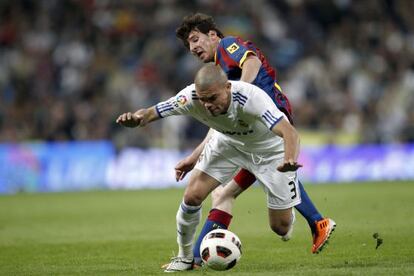A rivalry beyond reason
Richard Fitzpatrick's 'El clásico' threads together a narrative of Spain's great sporting saga

At the beginning of his book El Clásico, Richard Fitzpatrick asks "to what extent, in a country enthralled with its ghosts, is the Spanish Civil War still being played out on the football fields of Barcelona and Real Madrid?"
Ultimately, the Barcelona-based freelance journalist fails to provide a gilt-edged answer to this thorny question; but his efforts to thread together a narrative of Spain's great sporting rivalry from the dark days of the mid-20th century to the present Mourinho-envenomed media circus are certainly worthy of praise.
Fitzpatrick, a regular contributor to The Irish Times, is especially strong on the Catalan side of the divide, and not just to explain the unique symbiosis that has grown between Barça -- Més que un club -- and local separatist politics, but also pausing to show us the forgotten prisoners in the Catalanista cage: those who live in Barcelona and support Real Madrid.
Some of the best quotes in a book which leans heavily on material from face-to-face interviews come from members of the Juanito peña (fan club) based in the Catalan capital. The chapter appropriately titled Comanche Territory takes the reader through the looking glass, traveling with Madrid followers belonging to the club named for Real's quintessentially fiery player from the 1970s and 80s (before he died in a car crash) to a Champions League match in Lyon.
The Barcelona Madridistas complain that their sporting preference now means they are marked out in Catalan society. José Miguel Villarroya, who is somewhat bizarrely the son of an FC Barcelona employee, admits his passion is "without logic" of any kind:
"Now there is an agenda. A lot of politicians, bankers and industrialists are trying to create a homogenous society. They say a good Catalan person loves Catalonia [and] Barça is the image of Catalonia. [...] When I was a child in Franco's time, this was not a problem because there was no democracy. People couldn't talk about politics. Real Madrid, Barcelona, Espanyol were only football teams."
The son of a Barça employee admits his passion for Real is "without logic"
On Franco and the extent to which the dictator meddled on behalf of his supposedly beloved Real, Fitzpatrick paints a broad canvas of views and anecdotes, but, in perhaps yet another indication of how Spain's Generalísimo triumphed through ambiguity, no clear conclusion is reached. Several of his eminent interviewees, such as the writer and biographer of the controversial and hugely influential Real Madrid figure Santiago Bernabéu, Julián García Candau, suggest that the regime largely allowed the sport to keep a competitive edge and then basked in the reflected glory of the great Di Stéfano team.
"Franco's government benefited from Real Madrid because Real Madrid was a good propaganda tool outside Spain. It was its Trojan horse."
Not that the end of the dictatorship led the sporting rivalry to calmer political waters, as the 1981 end-of-season kidnapping of Barça forward Quini demonstrated. Barcelona lost the league.
The author of El Clásico also stays on the fence over the modern-day debate of whether Barcelona's Leo Messi or Real star Cristiano Ronaldo is the better player -- but he is a strong critic of the state of financial and sporting ruin to which the duopoly has taken Spanish soccer. The days before the start of the coming Liga season have been marked by a bitter dispute between the first division's medium-sized clubs and the big two over the unequal share-out of TV money.
From the pitch-side rage at Luis Figo's return to Camp Nou after defecting to Madrid to Messi skipping through massed Madrid ranks à la Maradona to score at the Bernabéu and coach Mourinho's craven post-match inquiry as to "why" the game's authorities are in cahoots to help Barça, this is a pungent portrayal of a saga that transcends the field of play. It remains, however, a rivalry that defies understanding.
Tu suscripción se está usando en otro dispositivo
¿Quieres añadir otro usuario a tu suscripción?
Si continúas leyendo en este dispositivo, no se podrá leer en el otro.
FlechaTu suscripción se está usando en otro dispositivo y solo puedes acceder a EL PAÍS desde un dispositivo a la vez.
Si quieres compartir tu cuenta, cambia tu suscripción a la modalidad Premium, así podrás añadir otro usuario. Cada uno accederá con su propia cuenta de email, lo que os permitirá personalizar vuestra experiencia en EL PAÍS.
¿Tienes una suscripción de empresa? Accede aquí para contratar más cuentas.
En el caso de no saber quién está usando tu cuenta, te recomendamos cambiar tu contraseña aquí.
Si decides continuar compartiendo tu cuenta, este mensaje se mostrará en tu dispositivo y en el de la otra persona que está usando tu cuenta de forma indefinida, afectando a tu experiencia de lectura. Puedes consultar aquí los términos y condiciones de la suscripción digital.








































